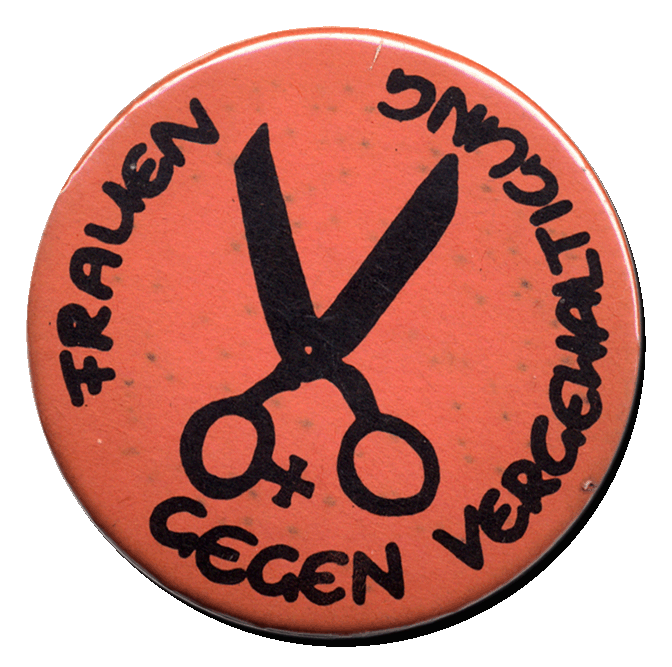Violence against women becomes a central issue of the German women’s movement. In Berlin, the first women’s shelter opens its doors. Female students and university graduates demand women’s studies at all universities.
January
In Berlin, the first women’s book distribution (FBV) is founded. The project is based on the idea of becoming independent from “male projects”. In this case is means that books being published by women publishers do not need to be distributed by men any more.
February 1976
Six activists from the Berlin Women’s Centre open the first Beratungs- und Informationsstelle für Frauen (BIFF) [advisory and information centre for women].
February 12, 1976
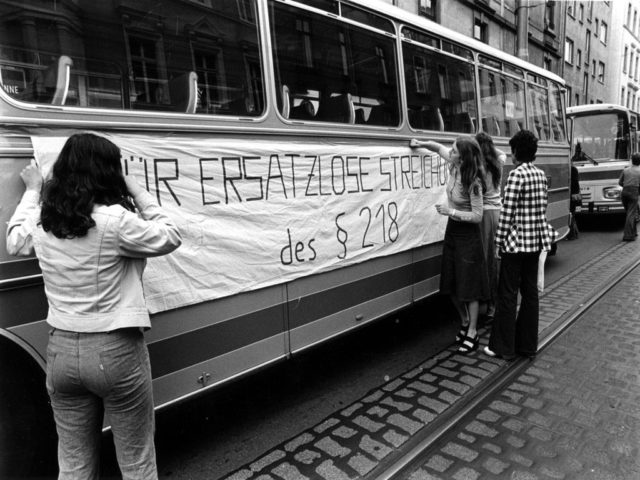
The Bundestag passes the new § 218 with the extended ‘Indikationsmodell’ by votes of the SPD / FDP coalition. Thus, the law now provides for a social indication: A woman may abort within the first three months of pregnancy if she is „in an emergency that weighs so heavily that she cannot be required to continue the pregnancy“. A doctor, who in this case is not allowed to do the abortion, determines whether and when it is an emergency. The paternalism of women remains.
The women’s movement, which had mobilized all its forces for a ‘Fristenlösung’ – which the Federal Constitutional Court finally reversed due to the constitutional complaint of CDU / CSU – deplores the „wretched concession that the male society has negotiated among themselves“ (Frauenkalender). „This law will continue to drive women into crime and into the hands of medical quacks“ (Frauenzentrum München).
Nevertheless, the „social indication“ has created a loophole for a legal abortion practice. The abortion is also funded by the health insurance. Some women’s groups continue to organize provocative „abortion trips“ to the Netherlands, while others together with doctors set up abortion clinics in Germany. Although the demand for the total deletion of § 218 basically remains, it is no longer at the center of the policy of the women’s movement from now on.
February 27, 1976
The Zeit reports on the issue of rape and violence in marriage under the title ‚The Woman as a Victim of Men‘. The newspaper refers to the book Against Our Will of the American feminist Susan Brownmiller. The topic of (sexual) violence against women, which is increasingly being brought to the public’s attention by the women’s movement, is so well received that it is now increasingly being picked up by the media.
4th-8th March 1976
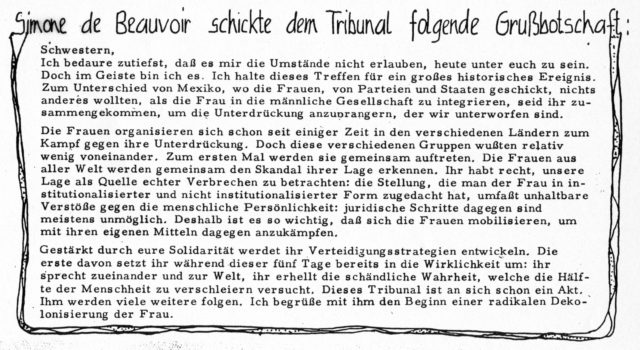
In Brussels, 1,500 participants from 33 countries come to the International Tribunal on Violence against Women. Women’s indictments cover all areas of society: from domestic violence to discriminatory laws to pornography. Concrete and structural violence are named as „part of a continuum of oppression and exploitation of women“. The tribunal provides important impulses to the West German ‘women’s shelter movement’, which has since emerged.
April
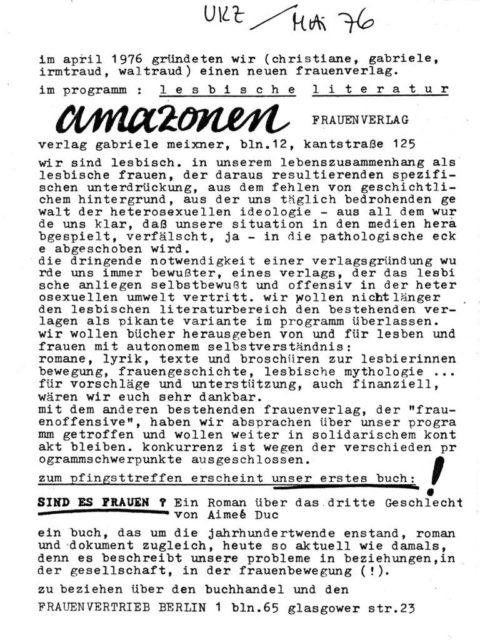
In Berlin, four women found the Amazonen-Frauenverlag. The first publishing house in the Federal Republic, which publishes lesbian literature exclusively, is to “represent the lesbian cause confidently and promotingly”. Among the first books published by Amazonen-Frauenverlag are Jill Johnston’s analysis Nationalität Lesbisch (original title: Lesbian Nation) and the historic Lesbian novel Sind es Frauen? by Aimée Duc from 1901.
In the course of the year, more women’s publishing houses are founded: in Munich, the Frauenbuchverlag (from the end of the 80s: Antje Kunstmann Verlag) and in Münster the Verlag Frauenpolitik.
The Stern published the following result of a survey under the title ‚Mein Mann hat mich vergewaltigt’ [‚My husband raped me‘]: „In every fifth marriage, the woman is forced to have sexual intercourse.“ The article also states that every fifth woman is of the opinion that a wife must be „sexually available to her husband whenever he wants it“.
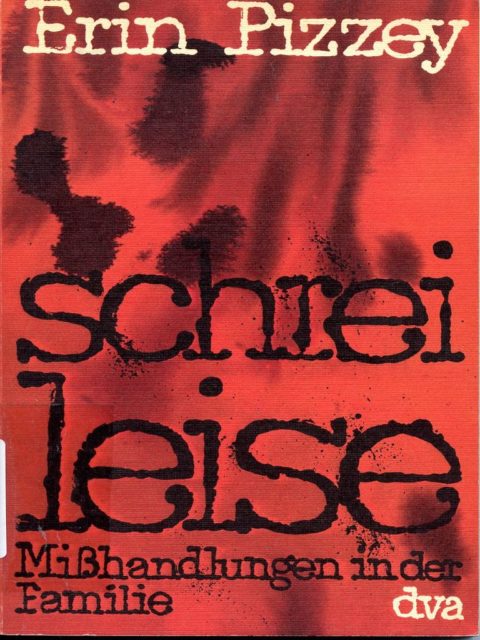
The book Schrei leise. Misshandlungen in der Familie by Erin Pizzey, director of London’s Women’s Aid Center, is published at the Deutsche Verlagsanstalt. It becomes a reference book for women’s shelter activists.
For the first time, the Bochum women’s group initiates the campaign Frauen nehmen Frauen mit [women take women with them]. With a red sticker of the same name on their car, female drivers are recognizable for other women who are looking for a ride. Background: Every second day – mostly on the way between the inner city and the university on the outskirts- a hitchhiker is being raped.
The Berlin women’s rock group Flying Lesbians, which emerged in 1975 from the Berlin Rockfete im Rock, release their first LP. On the LP, which is distributed by the Munich publisher Frauenoffensive, among other things the legendary text ‘Frauen gemeinsam sind stark’ [Women Together Are Strong] (by Renate Stefan) is set to music.
April 26, 1976
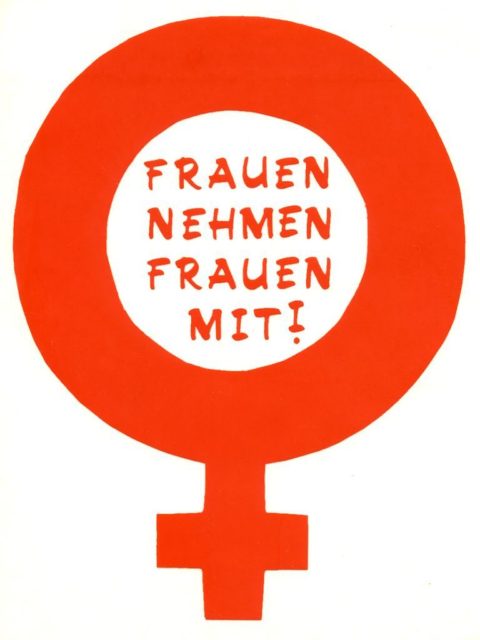
ARD broadcasts the WDR documentary Schreien nützt nichts – Brutalität in der Ehe [No use for screaming – marriage brutality] by Sarah Haffner. The author found around 400 cases of domestic violence during her research. „We heard stories that in their cruelty outweighed everything we could have imagined.“ Haffner, who will later process her research in the book Gewalt in der Ehe, also introduces the London Women’s Aid Center.
In the UK, there are already 80 of these refugee homes for maltreated women and children. In Holland, Norway, Denmark, the USA and Australia, the women’s movement has pushed through the creation of women’s shelters. In Germany, the first „house for beaten women“ will open its doors in November.
8/9. May 1976
In Munich, the publisher Frauenoffensive invites to the 1st meeting of writing women. About 100 women take part, including well-known authors such as Christa Reinig, Monika Sperr and Hedi Wyss. With the founding of women’s publishing houses, the first specialist publications and literary forums, the programmatic debate on ‚women’s literature‘ and ‚writing women‘ continues.
June 13, 1976
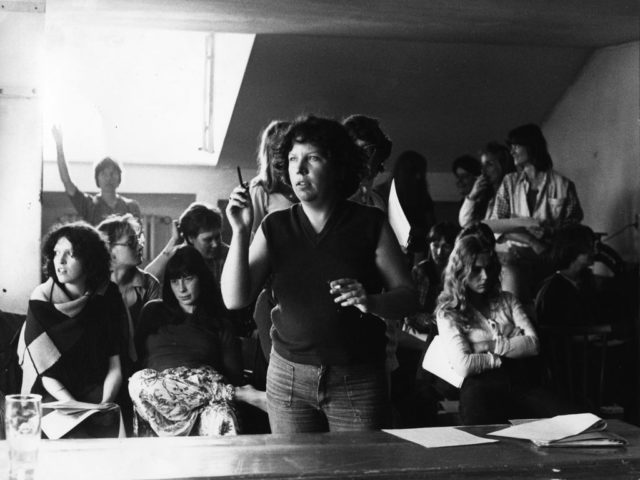
Alice Schwarzer invites interested journalists to a meeting to discuss the founding of a supraregional women’s magazine based on the American model Ms magazine. In contrast to the existing magazines of the women’s movement, which are „made by non-professional women“, which „stick closely to the women’s movement itself“, journalist Schwarzer plans a professionally made magazine, which is to assert itself in the market. The new women’s magazine should be „easily comprehensible and popular, which means that it should take broadly account of the problems and interests of most women while at the same time the theoretical discussion on the women’s issue should be brought forward creatively and audaciously.“
The women’s center in Berlin, where Schwarzer still lives at that time, demands from her to give account on her plans. In the crowded plenary session, she tells what she is planning. A conflict among sisters is in the air. – It will take almost seven months before the first issue of EMMA will be published on February 26, 1977 in Cologne.
July
![Clio : die Zeitschrift für Frauengesundheit. Feministisches Frauen-Gesundheits-Zentrum <Berlin> [Hrsg.]. (FMT-Signatur: Z-F002) Clio : die Zeitschrift für Frauengesundheit. Feministisches Frauen-Gesundheits-Zentrum [Hrsg.]. (FMT-Signatur: Z-F002)](http://frauenmediaturm.de/wp-content/uploads/2018/05/76_5a_Clio_1-768x1024.jpg)
CLIO, the first German feminist journal on health and self-help is published in Berlin by and for women.
1 July 1976
The law relating to the use of name is being reformed. It is now possible for men to adopt the name of their wife as a family name.
6th-10th July 1976
![Frauen und Wissenschaft : Beiträge zur Berliner Sommeruniversität für Frauen, Juli 1976. Gruppe Berliner Dozentinnen [Hrsg.] - Berlin: Courage-Verl., 1977. (FMT-Signatur: FE.03.009.01) Frauen und Wissenschaft : Beiträge zur Berliner Sommeruniversität für Frauen, Juli 1976. Gruppe Berliner Dozentinnen [Hrsg.] - Berlin: Courage-Verl., 1977. (FMT-Signatur: FE.03.009.01)](http://frauenmediaturm.de/wp-content/uploads/2018/07/Frauen_und_Wissenschaft-480x640.jpg)
The lectures held at the Summer University show the spectrum of this „woman-specific research content“: from the „Gretchen episode in Goethe’s Faust“ to „The Housework Today“ to „Experiences with male therapists“. 600 participants from all over Germany take part in this first summer university, which will take place seven times more until 1983 and will become the most important place of exchange for female academics within the New Women’s Movement.
August 27, 1976
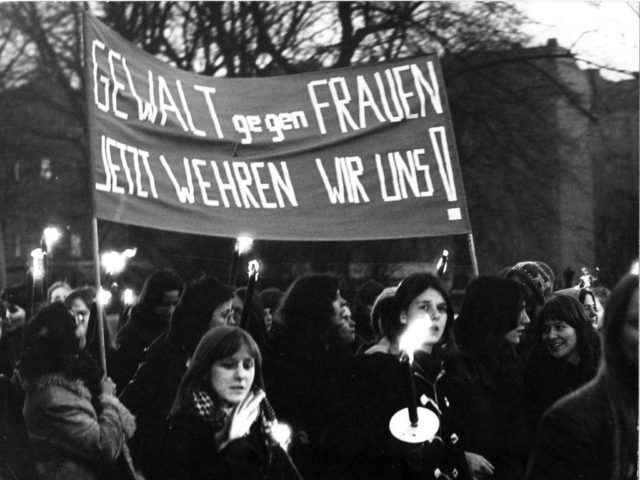
In Frankfurt, the lesbian center, the women’s center and the women’s meeting point Niedenau organize a ’night demonstration violence against lesbians‘. The cause for the action is the trial of two homosexual women for assault with fatalities. The couple had defended themselves at night against the repeated assaults of a man. In their flyer, the initiators of the demonstration call for the acquittal of both women: „All men who threaten women in any kind of way are criminal. We do not accept any male biased judiciary that judges women wrongly.“
September 1976
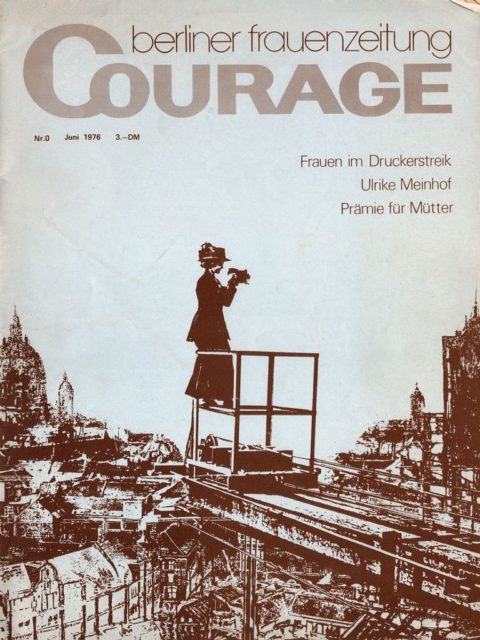
The first issue of Courage is released in Berlin (zero number in June). The women’s magazine starts with an edition of 12,000, which increases within two issues to 22,000. The editorial collective of approximately ten-members is made up of activists from the Berlin Women’s Center and the Lesbian Action Center (LAZ). The paper, which is deliberately made by non-journalists and is primarily aimed at the women’s movement and the alternative scene, „should become a medium in which women can present their situation publicly. Courage is what motivates women to deal with their own situation and with that of other women“. Within the feminist spectrum Courage represents the tendency of ’new femininity‘ and socialist feminism. Thus Courage affirms the remuneration of housework, assumes a natural ‚female peaceableness‘ of women. Courage will continue to be published until 1984.
November 1976
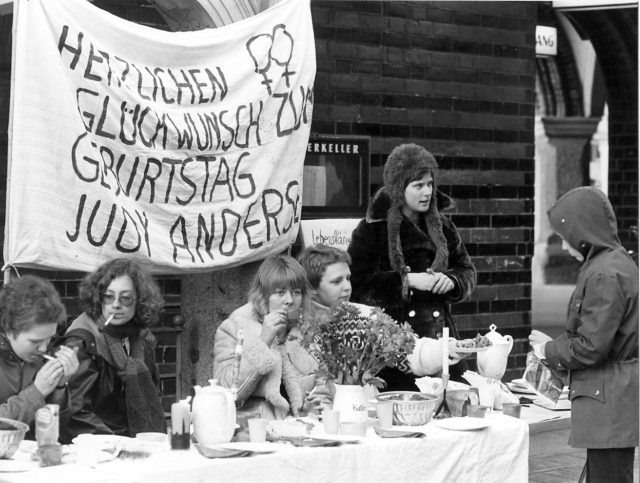
Women’s groups launch a nationwide solidarity campaign for Judy Andersen. Andersen has been in solitary confinement since being sentenced for life in 1974. Reason: The lesbian woman could otherwise use the opportunity for sexual contacts with her fellow prisoners. Danish Andersen, who has already attempted suicide in jail and is treated with psychotropic drugs, has requested her transfer to Denmark and the Danish government has also submitted an extradition request. The women’s groups protest with letters to the Ministry of Justice and the Federal Government against the conditions of detention and demand the extradition of Judy Andersen to Denmark. – It takes another ten years for Andersen to be transferred to Denmark and to be pardoned there in the same year.
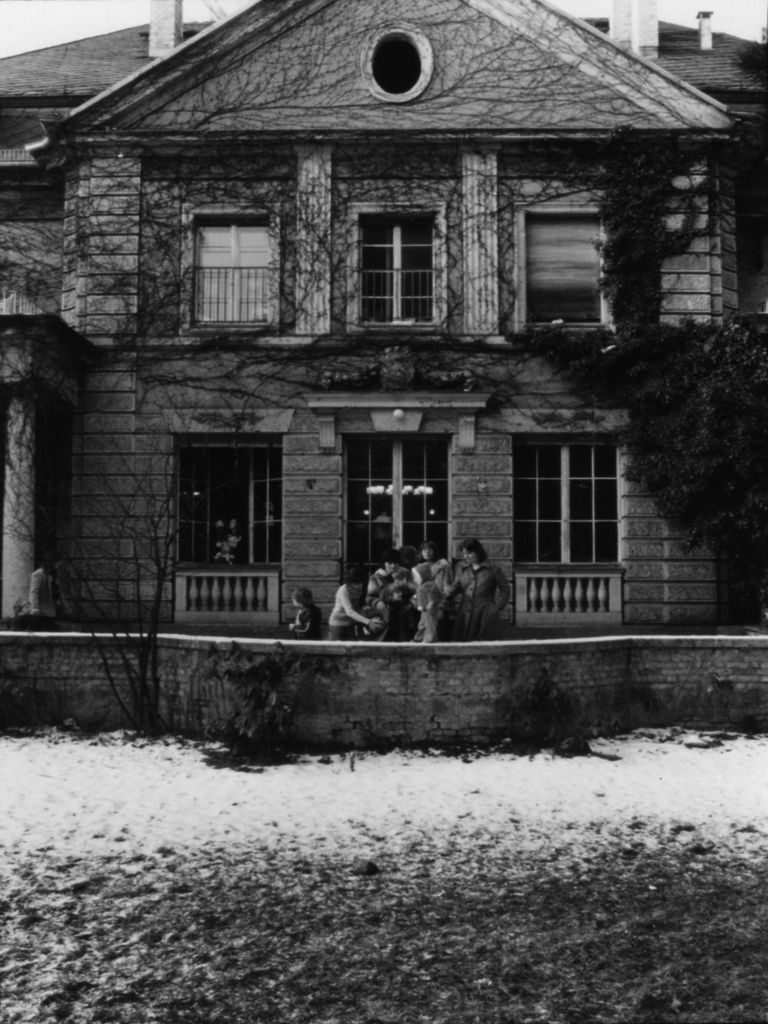
November 1, 1976
The first ‚home for beaten women‘ in the FRG opens in West-Berlin. The women’s shelter is being financed as a ‚model project‘ by the Federal government (80 percent) and the Berlin Senate (20 percent). For two years, this very first public funding for an ‚autonomous women’s project‘ had to be enforced by the eleven-members of the ‚Initiativgruppe Frauenhaus – Frauen helfen Frauen’. Federal Minister of Family Affairs Katharina Focke grants the subsidy election-selective few weeks before the federal election. Although the Berlin Family Senator Ilse Reichel supports the project, the Senate grants the subsidy only after public pressure and a survey in Berlin marriage counseling offices: Every eighth woman turns to the counseling office for abuse by her husband. Even before the house is opened, beaten women ask for accommodation. The 80 seats are occupied within a few days. In the first three months alone, 193 women with 300 children seek refuge in the women’s shelter.
More on this
Frankfurter Rundschau: Mit einem vorübergehenden Asyl ist es nicht getan
Alice Schwarzer: Ein Tag im Haus für geschlagene Frauen (EMMA 1/77)
With her book Sexismus – Über die Abtreibung der Frauenfrage the Berlin journalist Marielouise Janssen-Jurreit launches the term ’sexism‘ in Germany.


